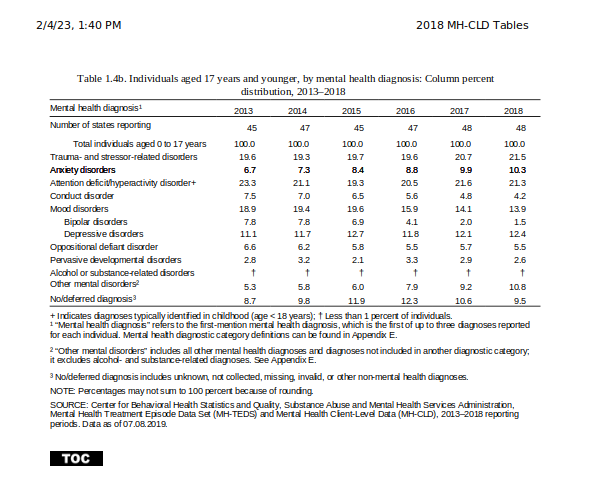Generation Z, those born after 1995, have experienced a steady increase in anxiety since 2010. This is in contrast to those born after 1958 who have seen a decrease in anxiety during the same period. The main reason for this increase in anxiety among Gen Z is attributed to the rapid conversion of early social networking into social media platforms.
The chart below gives an idea of the steady increase in anxiety disorders from individuals aged 17 years and younger, it went up 42.3% in just five years. It might take a little while to get updated results because of the COVID pandemic, but the writing is on the wall: it’s not going to be lower.

SOURCE: National Survey on Drug Use and Health (NSDUH)
After 2009, social media platforms such as Twitter, Facebook, and YouTube became the main mode of communication for many people. These platforms, being for-profit companies, drive to maximize user engagement through quantified prestige and influence while bombarding them with advertisements.
The pressure to perform and be publicly recognized has added to the anxiety levels of Gen Z, who have grown up in an era where social media is the norm. This shift in communication has created a generation that is highly connected yet emotionally immature, resulting in increased anxiety levels.
The move to social media has also led to a sudden increase in shouting and a decline in listening, resulting in a loss of shared stories, meanings, and human relationships.
How are you supposed to handle the situation when your young teenager asks for their first smart phone?
Teaching kids to be careful with social media can be a challenging task, but it is necessary in today’s digital age.
To start, it’s important to have open and honest conversations with kids about the potential dangers of social media, such as cyber-bullying, exposure to inappropriate content, and privacy concerns.
Encourage them to think before they post, to keep their personal information private, and to never share anything online that they wouldn’t want the whole world to see. Also, educate them on the importance of being kind and respectful online, and explain the long-term consequences of negative online behavior.
Emphasize the importance of using social media in a positive and responsible manner, and encourage them to limit their time spent on these platforms to avoid over-exposure. By teaching kids these skills and habits, you can help them develop healthy and safe social media practices.
To sum it up, the rapid growth of social media platforms has had a significant impact on the mental health of Generation Z. While these platforms have made it easier for people to communicate with others, they have also created a culture of competition and performance that has contributed to the increase in anxiety levels.
Kids are like sponges, they soak up everything and fast. It’s up to us to make sure they don’t soak up the filth.
